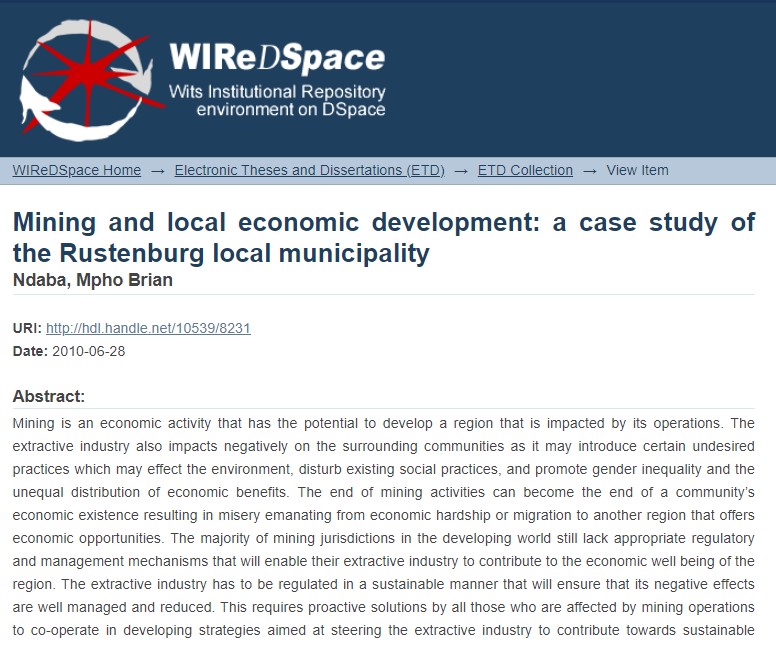Mining and local economic development
A case study of the Rustenburg local municipality

Mining is an economic activity that has the potential to develop a region that is impacted by its operations. The extractive industry may also impact negatively on the surrounding communities as it may introduce certain undesired practices which may effect the environment, disturb existing social practices, and promote gender inequality and the unequal distribution of economic benefits. The end of mining activities can become the end of a community’s economic existence resulting in economic hardship and /or migration to another region that offers economic opportunities. The majority of mining jurisdictions in the developing world still lack appropriate regulatory and management mechanisms that will enable their extractive industry to contribute to the economic wellbeing of the region. The extractive industry has to be regulated in a sustainable manner that will ensure that its negative effects are well managed and reduced. This requires proactive solutions by all those who are affected by mining operations to co-operate in developing strategies aimed at steering the extractive industry to contribute towards sustainable Local Economic Development (LED).
This research report investigates mining and sustainable LED. It also pays attention to international and local approaches in achieving sustainable LED in mining regions. A case study of the Rustenburg Local Municipality (RLM) has been conducted in order to ascertain the role of mining in contributing towards sustainable LED. The RLM is a municipal area that has mining as a dominant economic activity. The municipal area is currently experiencing an increase in economic activity as a result of its mining sector, mainly the mining of Platinum Group Metals (PGM). The municipality is struggling to develop an appropriate mining and LED strategy for its jurisdiction as a result of inadequate co-operation with stakeholders in the mining sector and insufficient capacity in the municipality. Owing to inadequate cooperation stakeholders in the mining sector are developing their own community development programmes with limited consultations with one another. The research report found that the development of sustainable LED strategies should involve all stakeholders; this process should ideally be headed by local authorities as they are responsible for managing and administering development projects in their jurisdiction. The RLM municipality has the potential to develop sustainable LED strategies aligned to its mining sector. This requires the strengthening of cooperation between stakeholders and capacity building in the municipality. The development and implementation of sustainable LED does not only depend on being spearheaded by the public sector as the research reports findings reveals that private sector driven sustainable LED strategies are possible.
This resource is part of the Mining Towns Collection kindly sponsored by the Municipal Capability and Partnership Programme. Abstract based on source.


Comments